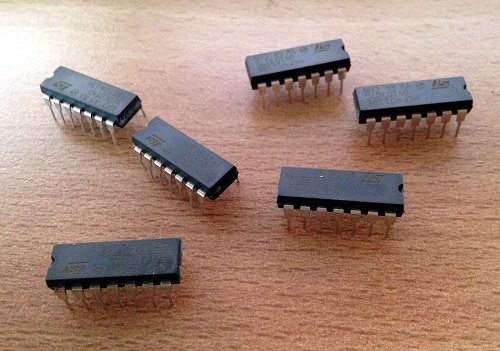A computer from scratch - Fish and chips
August 10, 2015 by Marco Cecconi
August 10, 2015 by Marco Cecconi
In the first installment of "A computer from scratch", I've built a NAND gate. I've also introduced the my "scaling" rule: if I build something, I can buy it pre-made, because I only have one lifetime to spend on this :-)
Therefore. I've bought a bunch of 4011 CMOS NAND gates, here they are:

And here's what they do:
With this in mind, and with the diagrams in my second installment, I proceeded with building NOT, AND and OR gates. Of course this wasn't without confusion and questions, but fortunately I could count on the help of the Electronics Stack Exchange community when I got stuck.
Here's what I built. Honestly, after getting stuck on where to put my resistors, all the builds were super easy.
A NOT gate is built by short-circuiting the inputs of a NAND. The circuit is very simple, it connects a button to pins A3 and B3, and connects the output Q3 to a LED.
The build looks like this
An AND gate is built by taking the result of a NAND and inverting it through a NOT. The circuit is also simple, it connects a button to pins A2 and another to B2, and connects the output Q2 to the previous NOT gate at A3/B3.
The build looks like this
An OR gate is built by negating both inputs and passing them throug a NAND. The circuit thus requires three NANDS. It connects a button to pins A2/B2 creating a NOT gate, and another button to A1/B1, creating another NOT. It then connects the two outputs Q1 and Q2 to A3 and B3 respectively. Q3 is connected to the LED as before
The build looks like this
In the next steps I'd like to try and build XORs, half adders and full adders. I'd also like to build some testing script via Arduino, although I'm not sure I can pull it off.
I am the Chief R&D at BaxEnergy, developer, hacker, blogger, conference lecturer. Bio: ex Stack Overflow core, ex Toptal core.
Read moreFebruary 20, 2026 by Marco Cecconi
Last night I decided to dedicate some time to my old [z80 emulator](https://sklivvz.com/posts/z80). I've squashed a few bugs and ported it to .NET 10. Then I added a ULA emulator.
Read moreFebruary 08, 2026 by Marco Cecconi
Compile-time translations via source generators, ICU MessageFormat + CLDR plurals, PO file workflows, no per-request allocations.
Read moreDecember 27, 2024 by Marco Cecconi
TDD can’t guarantee zero-defects. Let us debunk this software development myth.
Read moreMarch 12, 2023 by Marco Cecconi
Stack Overflow could benefit from adopting a using conversational AI to provide specific answers
Read moreWhat began, in Boole’s words, with an investigation “concerning the nature and constitution of the human mind,” could result in the creation of new minds—artificial minds—that might someday match or even exceed our own.
Read more…